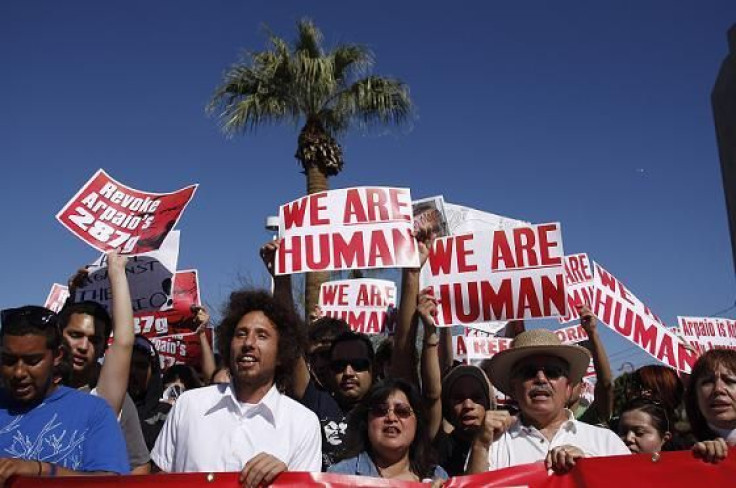Immigration Reform 2013: New Orleans Sheriff Agrees To Reject ICE Detention Requests

Federal agents tasked with enforcing immigration laws will largely be kept out of New Orleans jail, and the sheriff will no longer fulfill detention requests unless they are for people who have committed serious crimes like murder and armed robbery.
That’s the policy Orleans Parish Sheriff Marlin Gusman has adopted. A federal judge signed the settlement agreement on Friday, making New Orleans the most recent locality to adopt such a policy. Other places in California, Connecticut and Washington, D.C., already have these kinds of measures in place.
Under the agreement, Gusman’s office will also not initiate any investigation into the immigration status of those in its custody. It is also refusing to allow Immigration and Customs Enforcement (ICE) agents to conduct civil immigration status investigations. The sheriff’s office also will not provide information about any inmate’s release date or provide their addresses to federal agents. This is in stark contrast to what others in Georgia and other states have done.
“This settlement agreement is really a huge victory for New Orleans reconstruction workers and immigrant families,” said Jacinta Gonzalez, lead organizer at Congress of Day Laborers, a project of the New Orleans Workers’ Center for Racial Justice. “The implication is for many. For a long time people said that ICE holds were mandatory but in fact they are not. And sheriffs are able to decide whether or not they want to help facilitate racial profiling and constitutional violation or they prefer to stand up on the right side of history and defend immigrant workers.”
The agreement came after several immigrant workers in New Orleans were held for more than the allowed 48 hours, and after a lawsuit against Gusman brought by members of the Congress of Day Laborers about three years ago. Those members were arrested and did time on charges of misdemeanor battery and disturbing the peace, Gonzalez said. However, there was an immigration hold in place that ran into more than three months.
“No one should be torn away from their family and spend more than 90 days in jail without a charge, the way I did,” Antonio Ocampo, a plaintiff in the case, said. “I am proud that because of our fight, no other worker in New Orleans will go through what I did.”
Pablo Alvarado, executive director of the National Day Laborer Organizing Network, said laborers are to be thanked for moving immigration reform forward and for making New Orleans safer and fairer.
“As a result of their work, the criminalization of migrants and the destruction of families are being turned back,” he said. “By breaking ICE's hold on their community, by organizing and defending their rights, they have set a powerful example of the potential to advance immigration reform at the local level.”
The three-year fight to stop these detentions was also aided by the city council, which passed a resolution calling on the sheriff to put an end to those practices. It was one of several major breakthroughs for immigrants and their advocates, as they fought to keep the immigrants who worked to rebuild the city after Hurricane Katrina in 2005. About 100,000 immigrants moved to Louisiana that year to help with rebuilding efforts, according to reports. But it was Gusman’s sitting down with those directly affected by the actions in his prison that brought about the change. The prison didn’t respond to an emailed request for comment, but Gusman is being hailed for his “leadership and bravery.”
Despite the new policy, Bryan Cox, ICE regional spokesman in New Orleans, said identifying and removing criminal offenders remain the agency’s highest priority.
“ICE has implemented clear priorities that focus on convicted criminals and other public safety threats, as well as on those who repeatedly violate our immigration laws,” he said in a statement. “The federal government alone sets these priorities and places detainers on individuals arrested on criminal charges to ensure that dangerous criminal aliens and other priority individuals are not released from prisons and jails into our communities.”
While New Orleans has made progress, immigration reform at the federal level has stalled and there is a SAFE Act bill in the House of Representatives that proposes deputizing sheriffs to act as federal immigration law enforcement agents. The Congress of Day Laborers thinks other jurisdictions will be inspired by Gusman’s move.
“We’re so excited to have a precedent of a sheriff understanding and standing up for what is right and coming to this type of agreement,” Gonzalez said. “We think it opens the door for other sheriffs to be able to have the same leadership and bravery that the sheriff here has had on this.”
© Copyright IBTimes 2024. All rights reserved.












